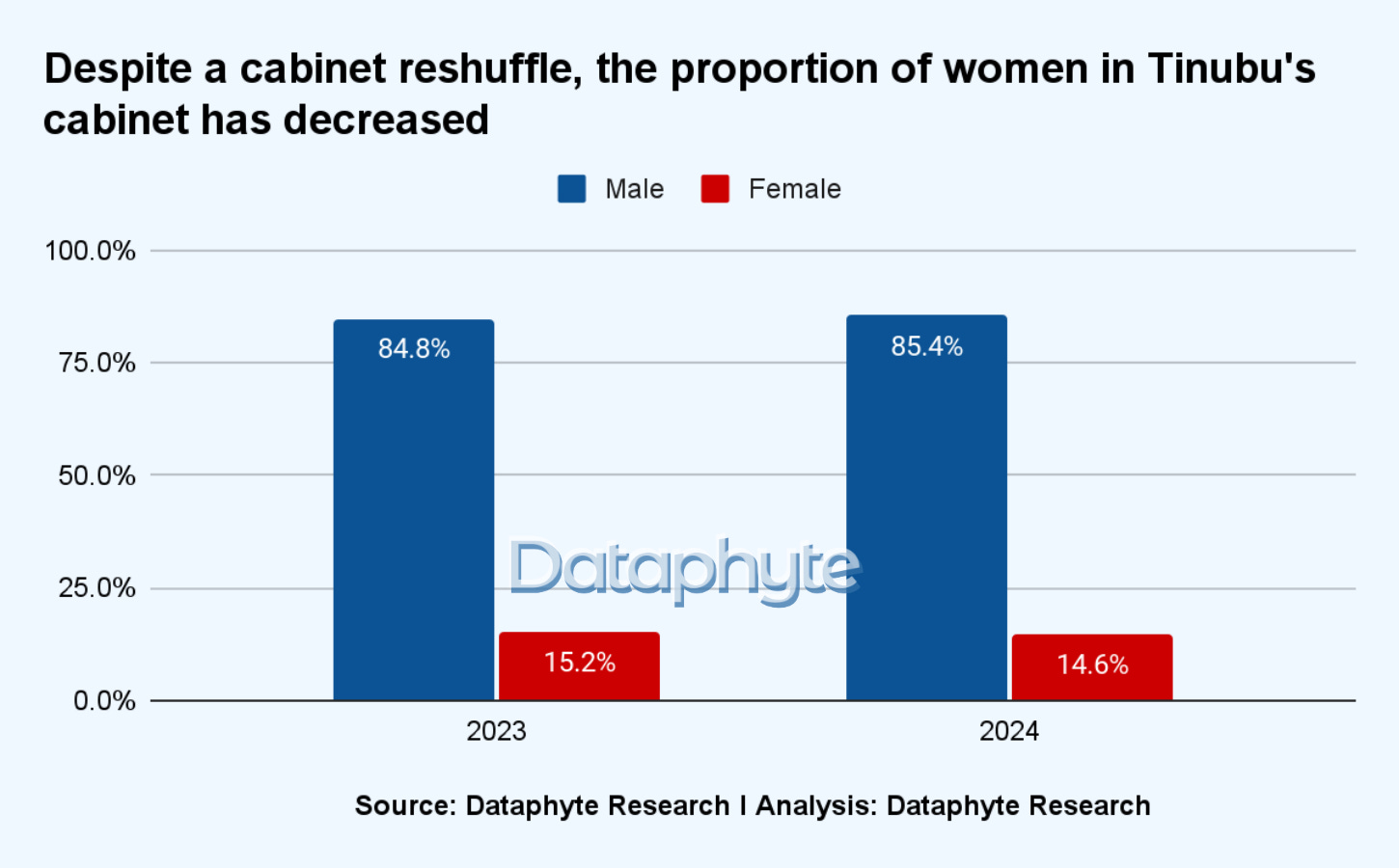Nigeria’s President, Bola Ahmed Tinubu, recently carried out a minor cabinet reshuffle.
On October 23, he dissolved some ministries and created some new ministries with the appointment of ministers to occupy the seats.
The discharged ministers are Minister of Women Affairs, Uju-Ken Ohanenye; Minister of Tourism, Lola Ade-John; Minister of Education, Prof. Tahir Mamman (SAN); Minister of State for Housing and Urban Development, Abdullahi Muhammad Gwarzo; and Minister of Youth Development, Dr. Jamila Bio Ibrahim.
The newly appointed ministers, who still have to be confirmed by the Senate, are Nentawe Yilwatda, Muhammadu Dingyadi, Bianca Odumegu-Ojukwu, Jumoke Oduwole, Idi Maiha, Yusuf Abdullahi Ata and Suwaiba Ahmad.
However, despite an increase in the number of ministries, the number of men occupying ministerial positions has increased compared to women.
When President Bola Ahmed Tinubu resumed office in 2023, he appointed 46 ministers, comprising 39 men and 7 women under the executive arm of government.
With this reshuffle, there are now 48 ministers in Nigeria, 41 men and 7 women. 85.4% of ministerial positions are occupied by men, compared to 14.6% of women.
This state of affairs goes against prior promises by the Tinubu campaign to advance gender equality, committing to 35% representation of women at all levels of government.
It is not only in the federal cabinet that this promise falls short. Low representation of women cuts across other arms of government.
For instance, in the Legislative arm of government, there are 451 men and 18 women occupying both the House of the Senate and House of Reps, which works out to 3.8% female representation.
In the Judicial arm of government, even though we currently have a female Chief Justice of the Federation, there are 17 men and 4 women in the Supreme Court. The percentage of male justices is 81% while that of the female is 19%.
There is a wide gap in female and male representation in the current administration. The gender disparity in these arms of government will make it difficult to make important decisions, especially on issues that affect women.
Also, the underrepresentation of women in politics can result in gender-biased policymaking, leading to insufficient focus on critical issues like gender-based violence, sexual harassment, girls' education, child marriage and female genital mutilation.
Inclusive Policies Toward Ensuring Women’s Participation in Politics
Women’s political participation is critical for a well-functioning democracy. Their inclusion is a matter of justice and a key factor in creating more effective governance.
Having more women in policymaking has been shown to help advance legislation on crucial issues, such as health, education, childcare, infrastructure and ending violence against women and serve as an inspiration for girls to pursue higher education and career opportunities.
However, the United Nations (UN) recommended some measures towards ensuring women's representation in political activities. The body recommends shunning violence against women in politics, as violence prevents women from fully participating in political and public life, weakening institutions and hindering progress in peace and development.
‘‘Governments need to enact and enforce laws to prevent election-related violence, hold perpetrators accountable, and improve access to justice for victims.’’
Also, to ensure the equal treatment of women voters, political candidates, and electoral administrators, electoral management bodies and other relevant stakeholders should develop and implement inclusive policies and codes of conduct that promote non-discrimination, integrity, transparency, freedom from violence, and dispute resolution.
‘‘To uphold women’s rights to vote, governments must facilitate voter registration, guarantee security at polling stations, and protect women from coercion or intimidation. Involving women in election administration enhances the inclusiveness and credibility of elections and encourages more women to vote.’’
To support women candidates and representative decision-making. Governments must invest in capacity-building programmes for women candidates to develop their leadership and campaigning skills, and regulate campaign financing to allocate targeted funds for women candidates.
Also, ‘‘there should be considerate regulation of campaign financing to encourage political parties to allocate targeted funds for women candidates and their campaigns. This approach would help bridge the financing gap and promote equal participation in politics.’’
Thanks for reading this edition of SenorRita. It was written by Kafilat Taiwo and edited by Joachim MacEbong






